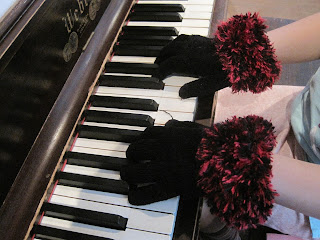Making Performing (Slightly Less) Scary
Here is one weird fact about me:
The thought of public speaking doesn't scare me. I mean, I still get nervous once I'm up there, but I kind of like the adrenalin rush.
But I'm also an introvert. Major, major, major introvert. Just ask my family.
One older friend who is also an introvert and who has been a ministry leader for many years of her long and fruitful life told me that public speaking is easier in some aspects than engaging one-on-one. But I think that, in my case, a long history of piano recitals and performances has something to do with my lack of fear. I mean, one of my majorly extroverted siblings avoids public speaking like the plague.
Still, that doesn't change the fact: Most of you find piano recitals scary. It's nerve-wracking to get up there in front of everyone and play. For the rare one who hasn't felt that, I'm very impressed. Because that was never me. And that's not most students. So... what do we do about it?
There's two options. Option #1: Let fear take control. Never get up on stage. Never play for anybody. Then you can never possibly fail. You'll never grow, either.
Option #2: Find a way to get up there, no matter how you feel about it. Be brave when you don't feel brave. You'll bring joy to others, and you'll become a braver, stronger person.
This post is all about getting to option #2. Because I don't believe that anyone should ever give in to Option #1.
- Take small steps. Play for your family members. Play for your friends. Play for your grandparents, your neighbours, your babysitters -- anyone you can. Play on public pianos, where you might be surprised at who's listening.
- Ask for a duet. Seriously, it's way easier to go up there with others than by yourself. I'll play a duet with my students, if that's what it takes.
- Remember: you only fail if you don't go up. If you go up, you're already amazing. You've already succeeded. So what if you mess up and make mistakes? No one notices. (And I'm serious! I've learned that through experience.)
- It's not about you. I learned this through handbells. Because, whenever we performed, we weren't really performing. Our director always had one focus: reach out and bless the community, whether we were playing in a seniour's home at Christmas or hosting our elegant Mother's Day concerts. The whole purpose of music is to praise God and bless others, as J.S. Bach put in more elegant terms. If you're focused on, "Everyone's going to be looking at me! What if I make a mistake?" of course you'll have stage fright. But what I've learned is that if your focus is, "I want to make the people listening happy," you don't get as nervous. So focus on making their day better.
- Use your nervousness. Being nervous can lead to mistakes, stage fright, and forgetting to bow, but it can also be used to give you energy as you play. It's the same feeling as being excited. Pretend you're excited, and let that physical energy sweep you through your performance.




Comments
Post a Comment